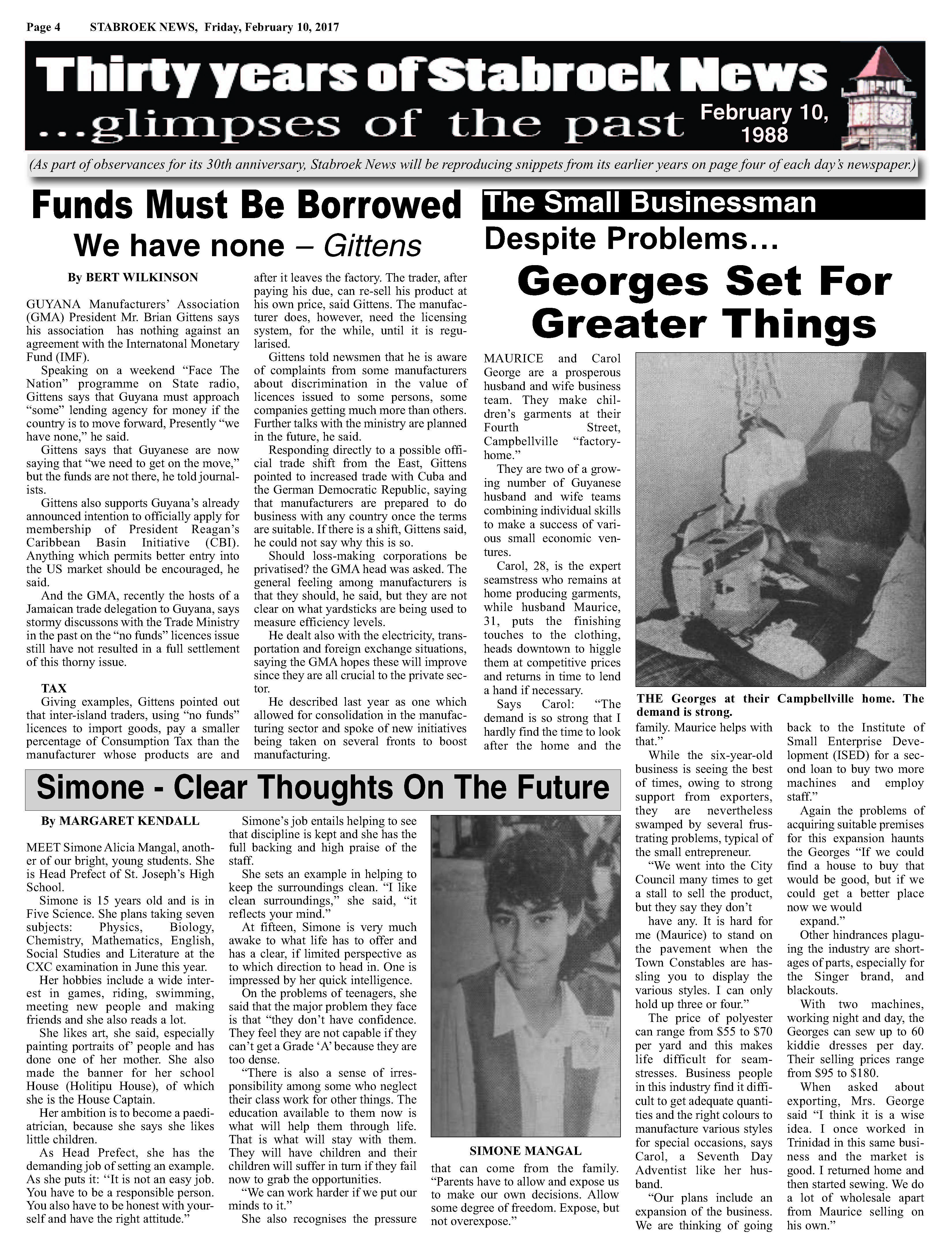By BERT WILKINSON
GUYANA Manufacturers’ Association (GMA) President Mr. Brian Gittens says his association has nothing against an agreement with the Internatonal Monetary Fund (IMF).
Speaking on a weekend “Face The Nation” programme on State radio, Gittens says that Guyana must approach “some” lending agency for money if the country is to move forward, Presently “we have none,” he said.
Gittens says that Guyanese are now saying that “we need to get on the move,” but the funds are not there, he told journalists.
Gittens also supports Guyana’s already announced intention to officially apply for membership of President Reagan’s Caribbean Basin Initiative (CBI). Anything which permits better entry into the US market should be encouraged, he said.
And the GMA, recently the hosts of a Jamaican trade delegation to Guyana, says stormy discussons with the Trade Ministry in the past on the “no funds” licences issue still have not resulted in a full settlement of this thorny issue.
TAX
 Giving examples, Gittens pointed out that inter-island traders, using “no funds” licences to import goods, pay a smaller percentage of Consumption Tax than the manufacturer whose products are and after it leaves the factory. The trader, after paying his due, can re-sell his product at his own price, said Gittens. The manufacturer does, however, need the licensing system, for the while, until it is regularised.
Giving examples, Gittens pointed out that inter-island traders, using “no funds” licences to import goods, pay a smaller percentage of Consumption Tax than the manufacturer whose products are and after it leaves the factory. The trader, after paying his due, can re-sell his product at his own price, said Gittens. The manufacturer does, however, need the licensing system, for the while, until it is regularised.
Gittens told newsmen that he is aware of complaints from some manufacturers about discrimination in the value of licences issued to some persons, some companies getting much more than others. Further talks with the ministry are planned in the future, he said.
Responding directly to a possible official trade shift from the East, Gittens pointed to increased trade with Cuba and the German Democratic Republic, saying that manufacturers are prepared to do business with any country once the terms are suitable. If there is a shift, Gittens said, he could not say why this is so.
Should loss-making corporations be privatised? the GMA head was asked. The general feeling among manufacturers is that they should, he said, but they are not clear on what yardsticks are being used to measure efficiency levels.
He dealt also with the electricity, transportation and foreign exchange situations, saying the GMA hopes these will improve since they are all crucial to the private sector.
He described last year as one which allowed for consolidation in the manufacturing sector and spoke of new initiatives being taken on several fronts to boost manufacturing.
Simone – Clear Thoughts On The Future
By MARGARET KENDALL
MEET Simone Alicia Mangal, another of our bright, young students. She is Head Prefect of St. Joseph’s High School.
Simone is 15 years old and is in Five Science. She plans taking seven subjects: Physics, Biology, Chemistry, Mathematics, English, Social Studies and Literature at the CXC examination in June this year.
Her hobbies include a wide interest in games, riding, swimming, meeting new people and making friends and she also reads a lot.
She likes art, she said, especially painting portraits of’ people and has done one of her mother. She also made the banner for her school House (Holitipu House), of which she is the House Captain.
Her ambition is to become a paediatrician, because she says she likes little children.
As Head Prefect, she has the demanding job of setting an example. As she puts it: ‘‘It is not an easy job. You have to be a responsible person. You also have to be honest with yourself and have the right attitude.”
Simone’s job entails helping to see that discipline is kept and she has the full backing and high praise of the staff.
She sets an example in helping to keep the surroundings clean. “I like clean surroundings,” she said, “it reflects your mind.”
At fifteen, Simone is very much awake to what life has to offer and has a clear, if limited perspective as to which direction to head in. One is impressed by her quick intelligence.
On the problems of teenagers, she said that the major problem they face is that “they don’t have confidence. They feel they are not capable if they can’t get a Grade ‘A’ because they are too dense.
“There is also a sense of irresponsibility among some who neglect their class work for other things. The education available to them now is what will help them through life. That is what will stay with them. They will have children and their children will suffer in turn if they fail now to grab the opportunities.
“We can work harder if we put our minds to it.”
She also recognises the pressure that can come from the family. “Parents have to allow and expose us to make our own decisions. Allow some degree of freedom. Expose, but not over expose.”
The Small Businessman
Despite Problems…
Georges Set For Greater Things
MAURICE and Carol George are a prosperous husband and wife business team. They make children’s garments at their Fourth Street, Campbellville “factory home.”
They are two of a growing number of Guyanese husband and wife teams combining individual skills to make a success of various small economic ventures.
Carol, 28, is the expert seamstress who remains at home producing garments, while husband Maurice, 31, puts the finishing touches to the clothing, heads downtown to higgle them at competitive prices and returns in time to lend a hand if necessary.
Says Carol: “The demand is so strong that I hardly find the time to look after the home and the family. Maurice helps with that.”
While the six-year-old business is seeing the best of times, owing to strong support from exporters, they are nevertheless swamped by several frustrating problems, typical of the small entrepreneur.
“We went into the City Council many times to get a stall to sell the product, but they say they don’t
have any. It is hard for me (Maurice) to stand on the pavement when the Town Constables are hassling you to display the various styles. I can only hold up three or four.”
The price of polyester can range from $55 to $70 per yard and this makes life difficult for seamstresses. Business people in this industry find it difficult to get adequate quantities and the right colours to manufacture various styles for special occasions, says Carol, a Seventh Day Adventist like her husband.
“Our plans include an expansion of the business. We are thinking of going back to the Institute of Small Enterprise Development (ISED) for a second loan to buy two more machines and employ staff.”
Again the problems of acquiring suitable premises for this expansion haunts the Georges “If we could find a house to buy that would be good, but if we could get a better place now we would
expand.”
Other hindrances plaguing the industry are shortages of parts, especially for the Singer brand, and blackouts.
With two machines, working night and day, the Georges can sew up to 60 kiddie dresses per day. Their selling prices range from $95 to $180.
When asked about exporting, Mrs. George said “I think it is a wise idea. I once worked in Trinidad in this same business and the market is good. I returned home and then started sewing. We do a lot of wholesale apart from Maurice selling on his own.”





